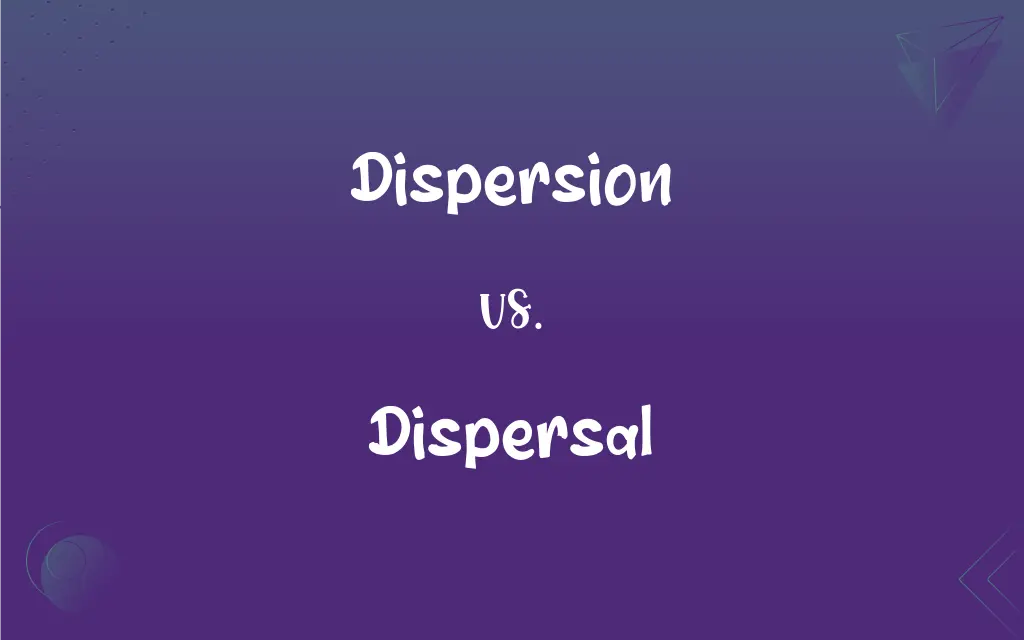Dispersion vs. Dispersal: What's the Difference?
Edited by Aimie Carlson || By Janet White || Updated on September 21, 2023
"Dispersion" refers to the spread of objects, values, or elements, while "Dispersal" is the action or process of distributing things or people over a wide area.

Key Differences
The terms "Dispersion" and "Dispersal" are related but denote different concepts. Dispersion is often related to the way in which objects, values, or elements are spread across a certain area, generally referring to the pattern in which they are located. On the other hand, Dispersal refers to the act or process of spreading or distributing things or people over wide areas, often implying an action undertaken.
In the realm of statistics and mathematics, Dispersion is used to describe the extent to which a set of values is stretched or squeezed. It helps in understanding the variability of a set. In contrast, Dispersal in ecological terms refers to the movement of individuals or seeds away from their area of origin or from centers of high population density, impacting the distribution of species.
Dispersion is a concept that has applications in various fields like physics, where it can refer to the separation of waves into spectral components. Dispersal is more about the actual process or action of spreading, often used in biology to explain the movement and spread of organisms in different habitats, affecting ecosystems and biodiversity.
In optics, Dispersion refers to the phenomenon where light is separated into its constituent colors, like when it passes through a prism. Dispersal, conversely, is often related to organisms, describing the way they spread and inhabit new areas, which is crucial for adaptation and survival in changing environments.
Essentially, while Dispersion is more about the state or condition of being spread out or separated, encompassing a range of applications across different domains, Dispersal is more action-oriented, relating predominantly to the movement and spread of living organisms, influencing ecological balance and species survival.
ADVERTISEMENT
Comparison Chart
Definition
The spread of values or elements.
The action of distributing over a wide area.
Field of Use
Physics, Statistics, Mathematics.
Ecology, Biology.
Focus
Pattern or extent of spread.
Action or process of spreading.
Involves
Objects, values, light.
Organisms, individuals, seeds.
Application Example
Separation of light into colors.
Movement of species to new habitats.
ADVERTISEMENT
Dispersion and Dispersal Definitions
Dispersion
In physics, the separation of waves into spectral components.
Dispersion causes white light to separate into different colors.
Dispersal
In ecology, the spreading of species to new areas.
Successful dispersal can lead to colonization of new habitats.
Dispersion
The distribution of values in a set.
The dispersion in the data set was minimal.
Dispersal
Spreading or distributing from a center.
The dispersal of the crowd was orderly.
Dispersion
The scattering of light particles.
The dispersion of light by a prism creates a spectrum of colors.
Dispersal
The distribution of individuals within a population.
Dispersal mechanisms affect population dynamics.
Dispersion
The act or process of dispersing.
Dispersal
The action or process of distributing things or people widely.
The dispersal of seeds is crucial for plant reproduction.
Dispersion
The state of being dispersed.
Dispersal
The movement of organisms from one place to another.
Animal dispersal influences ecological diversity.
Dispersion
Dispersion The Diaspora of the Jews.
Dispersal
The act or process of dispersing or the condition of being dispersed.
Dispersion
(Statistics) The degree of scatter of data, usually about an average value, such as the median.
Dispersal
The act or result of dispersing or scattering; dispersion.
Dispersion
Separation of a complex wave into its component parts according to a given characteristic, such as frequency or wavelength.
Dispersal
A dispersal prison.
Dispersion
Separation of visible light into colors by refraction or diffraction.
Dispersal
The act or result of dispersing or scattering; dispersion.
Dispersion
(Chemistry) See disperse system.
Dispersal
The act of dispersing or diffusing something;
The dispersion of the troops
The diffusion of knowledge
Dispersion
The state of being dispersed; dispersedness.
Dispersion
A process of dispersing.
Dispersion
The degree of scatter of data.
Dispersion
(optics) The separation of visible light by refraction or diffraction.
Dispersion
(medicine) The removal of inflammation.
Dispersion
The act or process of scattering or dispersing, or the state of being scattered or separated; as, the Jews in their dispersion retained their rites and ceremonies; a great dispersion of the human family took place at the building of Babel.
The days of your slaughter and of your dispersions are accomplished.
Dispersion
The separation of light into its different colored rays, arising from their different refrangibilities.
Dispersion
Spreading widely or driving off
Dispersion
The spatial property of being scattered about over an area or volume
Dispersion
The act of dispersing or diffusing something;
The dispersion of the troops
The diffusion of knowledge
Dispersion
The pattern in which things are spread over an area.
The dispersion of trees in the forest was uniform.
Dispersion
In statistics, a measure of the spread of values.
Standard deviation is a measure of dispersion.
FAQs
What does "Dispersion" generally refer to?
"Dispersion" generally refers to the spread or distribution of objects, values, or elements.
Does "Dispersion" describe a state or condition?
Yes, "Dispersion" describes the state or condition of being spread out or separated.
Is "Dispersion" a concept in physics and mathematics?
Yes, "Dispersion" is a significant concept in physics and mathematics, describing the spread or separation of components.
Is "Dispersion" used in statistics?
Yes, "Dispersion" is used in statistics to describe the extent of variability in a set of values.
Is "Dispersal" about the action of spreading?
Yes, "Dispersal" is about the action or process of distributing things or people widely.
Can "Dispersion" refer to the separation of light?
Yes, "Dispersion" can refer to the separation of light into its constituent colors.
Is "Dispersal" a biological concept?
Yes, "Dispersal" is predominantly a biological concept, focusing on the movement and spread of organisms.
Does "Dispersal" have an ecological implication?
Yes, "Dispersal" has ecological implications, affecting the distribution of species and ecological diversity.
Is "Dispersal" crucial for species survival?
Yes, "Dispersal" is crucial as it allows species to inhabit new areas, adapt, and survive.
Can "Dispersal" relate to the movement of individuals in a population?
Yes, "Dispersal" relates to the movement and distribution of individuals within a population.
Is "Dispersion" about patterns?
Yes, "Dispersion" often refers to the patterns in which elements or values are spread.
Can "Dispersion" be measured?
Yes, "Dispersion" can be measured using various statistical methods like standard deviation.
Can "Dispersal" lead to colonization of new habitats?
Yes, successful "Dispersal" can lead to the colonization of new habitats by species.
Is "Dispersal" related to the distribution of population?
Yes, "Dispersal" is related to how individuals are distributed within a population, affecting population dynamics.
Is "Dispersion" associated with the scattering of elements?
Yes, "Dispersion" is associated with the scattering or spreading of elements or values in a space.
About Author
Written by
Janet WhiteJanet White has been an esteemed writer and blogger for Difference Wiki. Holding a Master's degree in Science and Medical Journalism from the prestigious Boston University, she has consistently demonstrated her expertise and passion for her field. When she's not immersed in her work, Janet relishes her time exercising, delving into a good book, and cherishing moments with friends and family.
Edited by
Aimie CarlsonAimie Carlson, holding a master's degree in English literature, is a fervent English language enthusiast. She lends her writing talents to Difference Wiki, a prominent website that specializes in comparisons, offering readers insightful analyses that both captivate and inform.































































